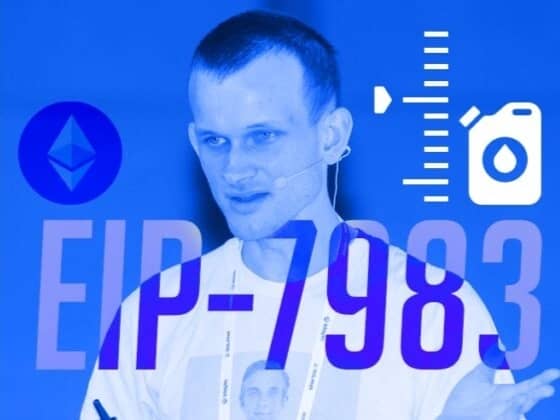Subscribe to wiki
Share wiki
Bookmark
EIP-7983
The Agent Tokenization Platform (ATP):Build autonomous agents with the Agent Development Kit (ADK)
0%
EIP-7983
EIP-7983 is an Ethereum Improvement Proposal (EIP) that proposes introducing a protocol-level cap on the maximum gas usage for individual transactions on the Ethereum network. The proposal aims to enhance network security, improve stability, and increase predictability in transaction processing.
Overview
EIP-7983, authored by Vitalik Buterin and Toni Wahrstätter, suggests setting a hard limit on the amount of gas a single transaction can consume. Under the current Ethereum architecture, a single transaction can theoretically utilize the entire gas limit of a block, which can lead to issues such as uneven load distribution, potential denial-of-service (DoS) vectors, and unpredictable network behavior. By implementing a transaction-specific gas cap, the proposal seeks to distribute gas consumption more evenly across transactions within a block, thereby mitigating these risks and promoting a more stable and predictable network environment. The proposal is part of a broader effort to simplify and improve the efficiency and security of the Ethereum network's base protocol. [1] [2] [3]
The proposed cap is intended to improve compatibility with zero-knowledge virtual machines (zkVMs) by encouraging large transactions to be broken down into smaller, more manageable parts. This facilitates better participation in distributed proving systems, which are crucial for scaling the network. The EIP specifies how transactions exceeding the proposed gas limit would be handled within the network's transaction pool and during block validation. [1] [4]
History
EIP-7983 was created on June 24, 2025. It builds upon previous efforts aimed at improving the predictability of transaction execution on Ethereum, such as EIP-7825. The proposal was introduced by Ethereum co-founder Vitalik Buterin and researcher Toni Wahrstätter as a standard track EIP in the core category. [1] [2]
Specification
The core specification of EIP-7983 is the enforcement of a protocol-level maximum gas limit of 16,777,216 gas (2^24) for any single transaction. This cap is independent of the overall block gas limit, which remains adjustable by miners or validators according to existing consensus rules. [1] [4]
Changes to the Ethereum Virtual Machine (EVM) behavior under this proposal include:
- Txpool Validation: During the validation process for the transaction pool, any transaction specifying a gas limit exceeding 16,777,216 will be considered invalid and will not be included in the txpool.
- Block Validation: As part of the block validation process before execution, any block containing a transaction with a gas limit greater than 16,777,216 will be deemed invalid and rejected by the network.
This enforcement mechanism ensures that transactions exceeding the cap cannot enter the network or be included in valid blocks. [1]
Rationale
The motivation behind EIP-7983 stems from several factors related to network efficiency, security, and future scalability.
- Inefficient Load Balancing: Transactions that consume a large portion or all of a block's gas can lead to uneven load distribution, impacting network stability.
- Quadratic Attacks: While measures have been taken since the 2016 DoS era, reducing the maximum size of a transaction provides additional protection against potential quadratic attacks that exploit excessive resource consumption.
- zkVM Compatibility: Splitting large transactions into smaller units is beneficial for distributed proving systems used by zkVMs. Although parallelization within a single large transaction is theoretically possible, current zkVM implementations are often unwilling to handle this complexity, making smaller transactions more compatible with existing and future zkVM designs.
- Parallel Execution: Variable and potentially very high gas usage by single transactions can cause load imbalance across execution threads, hindering efficient parallel processing.
The specific value of 16,777,216 (2^24) was chosen to strike a balance between accommodating most current use cases, including complex smart contract deployments and advanced decentralized finance (DeFi) interactions, while ensuring predictable execution bounds and consistent performance characteristics. This value also simplifies potential downstream engineering efforts by making it easier to subdivide operations. [1] [2] [5]
Backwards Compatibility
EIP-7983 is not backward-compatible with existing transactions that specify gas limits exceeding 16,777,216. Transactions with such high limits would need to be modified and potentially split into multiple smaller operations to comply with the new cap. However, the authors anticipate that this change will have a minimal impact on the majority of users and decentralized applications (dApps), as most transactions currently processed on the network utilize significantly less gas than the proposed limit. [1] [2]
Security Considerations
The implementation of a fixed transaction gas cap through EIP-7983 introduces several security benefits:
- DoS Mitigation: A fixed maximum gas limit for individual transactions reduces the attack surface for denial-of-service attacks that rely on submitting excessively high-gas transactions to overload the network or specific nodes. This specifically helps guard against quadratic attacks that consume excessive resources during transaction processing.
- Block Verification Stability: By capping the complexity and resource consumption of individual transactions, the process of validating blocks becomes more predictable and uniform across the network, contributing to overall network stability. [1] [4]
See something wrong?
The Agent Tokenization Platform (ATP):Build autonomous agents with the Agent Development Kit (ADK)
